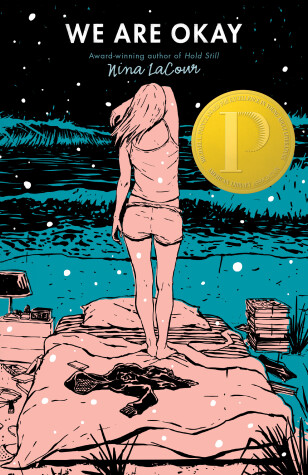Reviewed by nannah on
Content warnings:
- ableism! (the main reason for this is spoilery, but I’ll explain it below)
- drowning
- the Inuit slur
Representation:
- the main character (Marin) is a wlw
- her ex (Mabel) is bi
- Mabel and her family are latine
We Are Okay is a plotless novel (the genre, not my opinion) about a girl running to escape her grief. After her “gramps” dies, Marin goes to live in her college dorms early without telling anyone, cutting off contact with everyone she knew from her old life, and tries to make a fresh start. But when her ex and best friend, Mabel, comes to visit her over Christmas break, she’s forced to confront the reasons that made her run.
Plotless novels are ones in which characters are the driving force, not plot - there’s really no plot to speak of. They’re more “slice of life” stories, or books with the focus being on character tension rather than plot, or even “picaresque novels,” which are simply series of vignettes. We Are Okay explores a couple days of Marin's grief along with flashbacks that led up to Gramp’s death.
I don’t have a problem with the fact that it’s a plotless novel, that characters enter into the story only to never appear again, or that kind of pointless things are described in great detail, like peeing or characters brushing their teeth. I don’t have a problem with them, but I’m not interested in how they’re written, either, done in a way that screams, “I’m being deep! Can you tell?” like every time Marin compares her situation to something that happens in her favorite classic novel.
But most of all, and honestly everything else pales in comparison to this, is the ableism. I am so, SO surprised that no one has mentioned this (or maybe I haven’t looked thoroughly enough), but the entire twist (and the entire story, then) is only made possible at all because of ableist tropes! It would be impossible to write this without it. There’s a mystery building throughout the novel: why did Marin run away without telling anyone after her Gramps died? It’s not just because of grief. Something in her grandpa’s room scared her. And of course later it’s discovered that Marin’s grandpa suffered from grief so strongly he was unable to move past Marin’s mother’s death. He had created a museum-like shrine of her in his bedroom closet and wrote letters to her, to which he replied to himself as Marin’s mother.
Now, if this had been handled differently, if Marin had processed this and had maybe been taught that this kind of mental illness (aka mental illnesses beyond depression or anxiety) wasn’t something scary, I would feel differently. But till the end she maintained that Gramps had failed her, that she didn’t know him at all, that he wasn’t even a person, etc. She didn’t sympathize with him in any way, even though she suffered greatly from grief and depression herself. And while the ending was immensely satisfying when she finally got a connection to her mother she'd been missing her entire life, it just doesn't make up for everything else.
Maybe that's also because this isn’t the only instance of ableism in the book (though it is the worst and the biggest). At one point, Marin had lived in a motel that had seen better days, and she tells her friend about all the mentally ill people she had come across there like they're zoo animals, the “howling woman” being the most notable. Worse, Mabel compares herself to Jane Eyre, and this woman as Mr. Rochester’s First wife: “The fact of her was scary enough, but the fact of me, in an identical room, just as alone as she was, that was the worst part. There was only a wall between us, and it was so thin it was almost nothing. Jane, too, was once locked up in a room with a ghost. It was terrifying …”
Combined with what we now know of Gramps, it doesn’t paint a great picture.
All in all I don’t think Nina LaCour is someone whose writing I enjoy. I suspected it with her other novel, Everything Leads To You, and now I know for sure.
Reading updates
- Started reading
- 30 March, 2021: Finished reading
- 30 March, 2021: Reviewed
